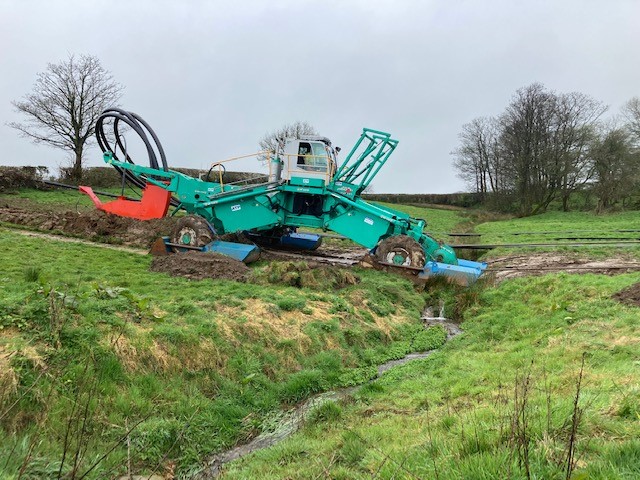Helping pregnant cows and spotting leaky...
Scott Petty, Chief Technology Officer at Vodafone UK writes about the exciting technology that is...
about this blogRead moreEnergy companies attempting to cash in on Wales’s natural resources and inflict steel pylons across the countryside would have been left feeling slightly miffed after a motion to underground new electricity cabling was voted down by Labour. Yet, the motion galvanised the support of the Labour Cabinet Secretary, Julie James.
Plaid Cymru tabled a debate and proposed a series of motions that would secure the future of undergrounding cables across Wales’s most beautiful landscapes enjoyed by hundreds of thousands of tourists every year. Heledd Fychan SM (Plaid Cymru) laid out the following proposals which would change the policy of Planning Wales, making it incredibly difficult – if not impossible – for energy companies to press ahead with their “pylon plans”.
The motions asked that the Senedd:
Recognises the preferred position of the Welsh Government that new power lines should be placed underground where possible.
Believes that wherever physically possible the undergrounding of new power lines shall be undertaken by way of cable ploughing in preference to open trenching.
Calls on the Welsh Government to update Planning Policy Wales paragraph 5.7.9:
a) to remove the existing caveat: ‘however it is recognised that a balanced view must be taken against costs which would render otherwise acceptable projects unviable’; and
b) so that the undergrounding of new infrastructure for conveying electricity shall be an absolute rather than a preferred position, the policy should state: ‘New power lines should be laid underground.’
The motions were supported by the Welsh Conservative benches via Russell George SM, Darren Millar SM and Mark, Isherwood SM, who dispelled myths about undergrounding being impossible, and highlighted communities’ concerns about the effect of pylons on health and well-being, aesthetics of landscapes, and local economies.
Rural communities are indeed under-pinned by tourism. The farming sector plays host to many farm diversification projects – from offering accommodation, to farm tours, vineyards, and other food projects. Communities are rightly concerned that invasive, unnecessary, and out of date pylon infrastructure would have a profoundly negative impact on the tourism sector and the people who live in the proposed areas.

Thousands of people signed the Countryside Alliance’s lobby in 2023 calling for the undergrounding of the cables, to which the Minister responded to, confirming the Welsh Government’s position that undergrounding was the preferred option. Indeed in answering the debate, Mid and West Wales Senedd Member Cefin Cambell noted the volume of e-mails that had been directed to Senedd Members on this burning issue.
Responding to the debate, Cabinet Secretary for Housing, Local Government and Planning Julie James gave a firm response to the preference of Welsh Government.
She said:
“I just want to say that I don't think we're miles apart on this motion at all. The original motion and the Welsh Government's position are not worlds apart at all. We have a preference for undergrounding electricity cables as well.
I am very happy to look at how we can make sure that a lot more of our cabling goes underground. But there is, I'm sorry to be pedantic, but the 'where possible' is a problem in the motion, because it is physically possible to do it in places where I think we'd all agree we don't want”.
She went on say:
“So, I have no philosophical problem with this motion, but I just think the wording is problematic, so our motion changes it. But I just want to be really clear with the Senedd today that I have no fundamental problem with most of the points made”.
The Cabinet Secretary also noted the creation of what is supposed to be an independent advisory group that has been set up by the department of her colleague Jeremy Miles, whose portfolio includes energy. The group is intended to facilitate various work streams to include a review on the true cost of undergrounding, an issue that has been glossed over by some companies, including Green GEN, which intends to construct the proposed pylon route named “Towy Usk” from Nantmithil to Llandyfaelog. In her response, the Minister referred to the “need to tighten up what we mean by 'unaffordable' in a very big way”.
The Countryside Alliance’s Director for Wales Rachel Evans met with Cabinet Secretary Jeremey Miles’ officials in May 2024 and has requested that the Alliance becomes a member of that group along with other land-owning representing organisations that do not have a track record of campaigning against pylon infrastructure. Whilst we have not had a reply from Welsh Government to date, it is evident that the group have had their first meeting. It is believed that Natural Resources Wales are also members of the independent advisory group, a group that has not yet formally being announced.
Rachel Evans said:
“If the remit of the group has changed since I met officials in May, I ask Welsh government how are the communities opposing the infrastructure being represented? In a Renewables UK event at the Senedd, Cabinet Secretary Jeremy Miles said that ‘we absolutely must take communities with us’, yet without representation in this group, they are purposely being left behind.
![[Rural Communities]](https://www.countryside-alliance.org/hs-fs/hubfs/Imported_Blog_Media/cow-2445514-1145x700-Mar-30-2023-08-27-26-5221-PM.jpg?width=365&name=cow-2445514-1145x700-Mar-30-2023-08-27-26-5221-PM.jpg)
Scott Petty, Chief Technology Officer at Vodafone UK writes about the exciting technology that is...
about this blogRead more![[Scotland, Rural Communities]](https://www.countryside-alliance.org/hs-fs/hubfs/Imported_Blog_Media/flytip-Mar-30-2023-09-13-47-8920-PM.jpg?width=365&name=flytip-Mar-30-2023-09-13-47-8920-PM.jpg)
The UK, and Scotland, have a fly-tipping and litter problem and the Scottish Countryside Alliance...
about this blogRead more![[Scotland]](https://www.countryside-alliance.org/hs-fs/hubfs/Landscapes/North%20Yorkshire%20Moor_Shutterstock_July%202023_1400x930px.jpg?width=365&name=North%20Yorkshire%20Moor_Shutterstock_July%202023_1400x930px.jpg)
The Scottish Countryside Alliance is now a board member of Country Sport Scotland.
about this blogRead more